|
SNAP Library 6.0, Developer Reference
2020-12-09 16:24:20
SNAP, a general purpose, high performance system for analysis and manipulation of large networks
|
|
SNAP Library 6.0, Developer Reference
2020-12-09 16:24:20
SNAP, a general purpose, high performance system for analysis and manipulation of large networks
|
Statistics of a Graph Snapshot. More...
#include <gstat.h>
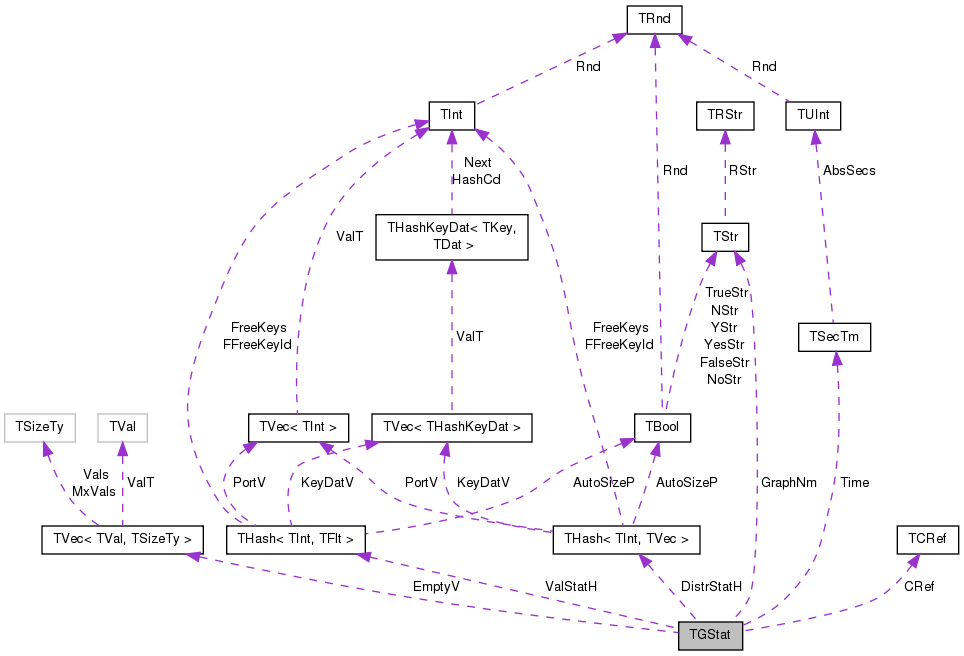
Classes | |
| class | TCmpByVal |
Public Types | |
| typedef TQuad< TStr, TStr, TStr, TGpScaleTy > | TPlotInfo |
Public Member Functions | |
| TGStat (const TSecTm &GraphTm=TSecTm(), const TStr &GraphName=TStr()) | |
| TGStat (const PNGraph &Graph, const TSecTm &Time, TFSet StatFSet=TFSet(), const TStr &GraphName=TStr()) | |
| TGStat (const PUNGraph &Graph, const TSecTm &Time, TFSet StatFSet=TFSet(), const TStr &GraphName=TStr()) | |
| TGStat (const PNEGraph &Graph, const TSecTm &Time, TFSet StatFSet=TFSet(), const TStr &GraphName=TStr()) | |
| template<class PGraph > | |
| TGStat (const PGraph &Graph, const TSecTm &Time, TFSet StatFSet=TFSet(), const TStr &GraphName=TStr()) | |
| TGStat (const TGStat &GStat) | |
| TGStat (TSIn &SIn) | |
| void | Save (TSOut &SOut) const |
| template<class PGraph > | |
| PGStat | New (const PGraph &Graph, const TSecTm &Time, TFSet StatFSet=TFSet(), const TStr &GraphNm=TStr()) |
| PGStat | Clone () const |
| TGStat & | operator= (const TGStat &GStat) |
| bool | operator== (const TGStat &GStat) const |
| bool | operator< (const TGStat &GStat) const |
| int | GetYear () const |
| int | GetMonth () const |
| int | GetDay () const |
| int | GetHour () const |
| int | GetMin () const |
| int | GetSec () const |
| TStr | GetTmStr () const |
| void | SetTm (const TSecTm &GraphTm) |
| TStr | GetNm () const |
| void | SetNm (const TStr &GraphName) |
| int | GetTime (const TTmUnit &TimeUnit) const |
| int | GetVals () const |
| bool | HasVal (const TGStatVal &StatVal) const |
| double | GetVal (const TGStatVal &StatVal) const |
| void | SetVal (const TGStatVal &StatVal, const double &Val) |
| int | GetDistrs () const |
| bool | HasDistr (const TGStatDistr &Distr) const |
| const TFltPrV & | GetDistr (const TGStatDistr &Distr) const |
| void | GetDistr (const TGStatDistr &Distr, TFltPrV &FltPrV) const |
| void | SetDistr (const TGStatDistr &Distr, const TFltPrV &FltPrV) |
| int | GetNodes () const |
| int | GetEdges () const |
| void | TakeStat (const PNGraph &Graph, const TSecTm &Time, TFSet StatFSet, const TStr &GraphName) |
| void | TakeStat (const PUNGraph &Graph, const TSecTm &Time, TFSet StatFSet, const TStr &GraphName) |
| template<class PGraph > | |
| void | TakeStat (const PGraph &Graph, const TSecTm &Time, TFSet StatFSet, const TStr &GraphName) |
| template<class PGraph > | |
| void | TakeBasicStat (const PGraph &Graph, const bool &IsMxWcc=false) |
| template<class PGraph > | |
| void | TakeBasicStat (const PGraph &Graph, TFSet FSet, const bool &IsMxWcc=false) |
| template<class PGraph > | |
| void | TakeSccStat (const PGraph &Graph, TFSet StatFSet) |
| template<class PGraph > | |
| void | TakeBccStat (const PGraph &Graph, TFSet StatFSet) |
| template<class PGraph > | |
| void | TakeDegDistr (const PGraph &Graph) |
| template<class PGraph > | |
| void | TakeDegDistr (const PGraph &Graph, TFSet StatFSet) |
| template<class PGraph > | |
| void | TakeDiam (const PGraph &Graph, const bool &IsMxWcc=false) |
| template<class PGraph > | |
| void | TakeDiam (const PGraph &Graph, TFSet StatFSet, const bool &IsMxWcc=false) |
| template<class PGraph > | |
| void | TakeConnComp (const PGraph &Graph) |
| template<class PGraph > | |
| void | TakeConnComp (const PGraph &Graph, TFSet StatFSet) |
| template<class PGraph > | |
| void | TakeClustCf (const PGraph &Graph, const int &SampleNodes=-1) |
| template<class PGraph > | |
| void | TakeTriadPart (const PGraph &Graph) |
| void | TakeSpectral (const PNGraph &Graph, const int _TakeSngVals=-1) |
| void | TakeSpectral (const PNGraph &Graph, TFSet StatFSet, int _TakeSngVals=-1) |
| void | Plot (const TGStatDistr &Distr, const TStr &FNmPref, TStr Desc=TStr(), bool PowerFit=false) const |
| void | Plot (const TFSet &FSet, const TStr &FNmPref, const TStr &Desc=TStr(), bool PowerFit=false) const |
| void | PlotAll (const TStr &FNmPref, TStr Desc=TStr(), bool PowerFit=false) const |
| void | DumpValStat () |
| void | AvgGStat (const PGStatVec &GStatVec, const bool &ClipAt1=false) |
| void | AvgGStat (const TGStatV &GStatV, const bool &ClipAt1=false) |
Static Public Member Functions | |
| static PGStat | New (const TSecTm &Time=TSecTm(), const TStr &GraphName=TStr()) |
| static PGStat | New (const PNGraph &Graph, const TSecTm &Time, TFSet StatFSet=TFSet(), const TStr &GraphNm=TStr()) |
| static PGStat | New (const PUNGraph &Graph, const TSecTm &Time, TFSet StatFSet=TFSet(), const TStr &GraphNm=TStr()) |
| static PGStat | New (const PNEGraph &Graph, const TSecTm &Time, TFSet StatFSet=TFSet(), const TStr &GraphNm=TStr()) |
| static PGStat | Load (TSIn &SIn) |
| static TStr | GetDistrStr (const TGStatDistr &Distr) |
| static TStr | GetValStr (const TGStatVal &Val) |
| static TPlotInfo | GetPlotInfo (const TGStatVal &Val) |
| static TPlotInfo | GetPlotInfo (const TGStatDistr &Distr) |
| static TFSet | NoStat () |
| static TFSet | BasicStat () |
| static TFSet | DegDStat () |
| static TFSet | NoDiamStat () |
| static TFSet | NoDistrStat () |
| static TFSet | NoSvdStat () |
| static TFSet | AllStat () |
Public Attributes | |
| TSecTm | Time |
| TStr | GraphNm |
| TIntFltH | ValStatH |
| THash< TInt, TFltPrV > | DistrStatH |
Static Public Attributes | |
| static int | NDiamRuns = 10 |
| static int | TakeSngVals = 100 |
Private Attributes | |
| TCRef | CRef |
Static Private Attributes | |
| static const TFltPrV | EmptyV = TFltPrV() |
Friends | |
| class | TCmpByVal |
| class | TPt< TGStat > |
| typedef TQuad<TStr, TStr, TStr, TGpScaleTy> TGStat::TPlotInfo |
| TGStat::TGStat | ( | const PNGraph & | Graph, |
| const TSecTm & | Time, | ||
| TFSet | StatFSet = TFSet(), |
||
| const TStr & | GraphName = TStr() |
||
| ) |
Definition at line 25 of file gstat.cpp.
References TakeStat().
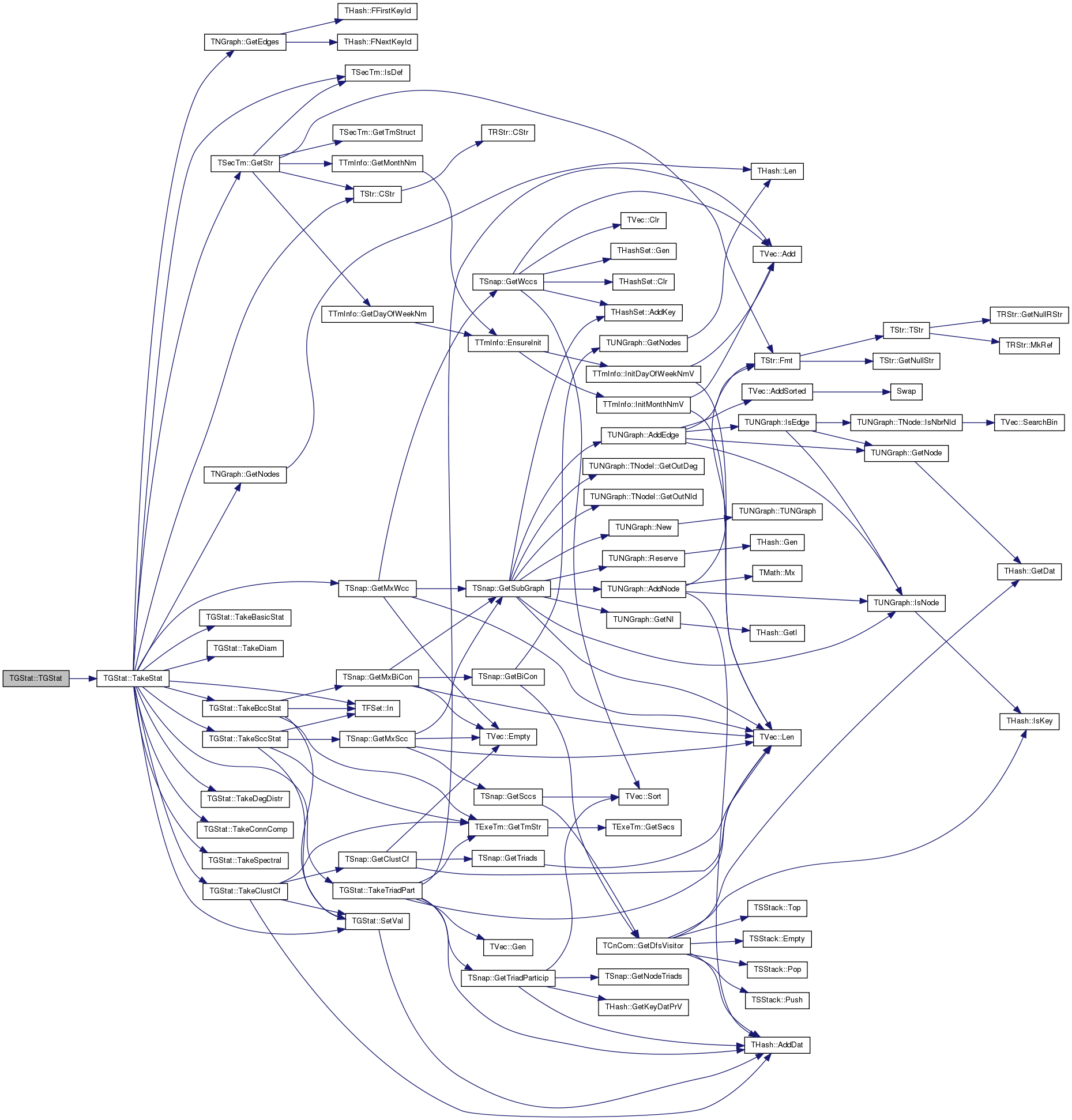
| TGStat::TGStat | ( | const PUNGraph & | Graph, |
| const TSecTm & | Time, | ||
| TFSet | StatFSet = TFSet(), |
||
| const TStr & | GraphName = TStr() |
||
| ) |
Definition at line 29 of file gstat.cpp.
References TakeStat().
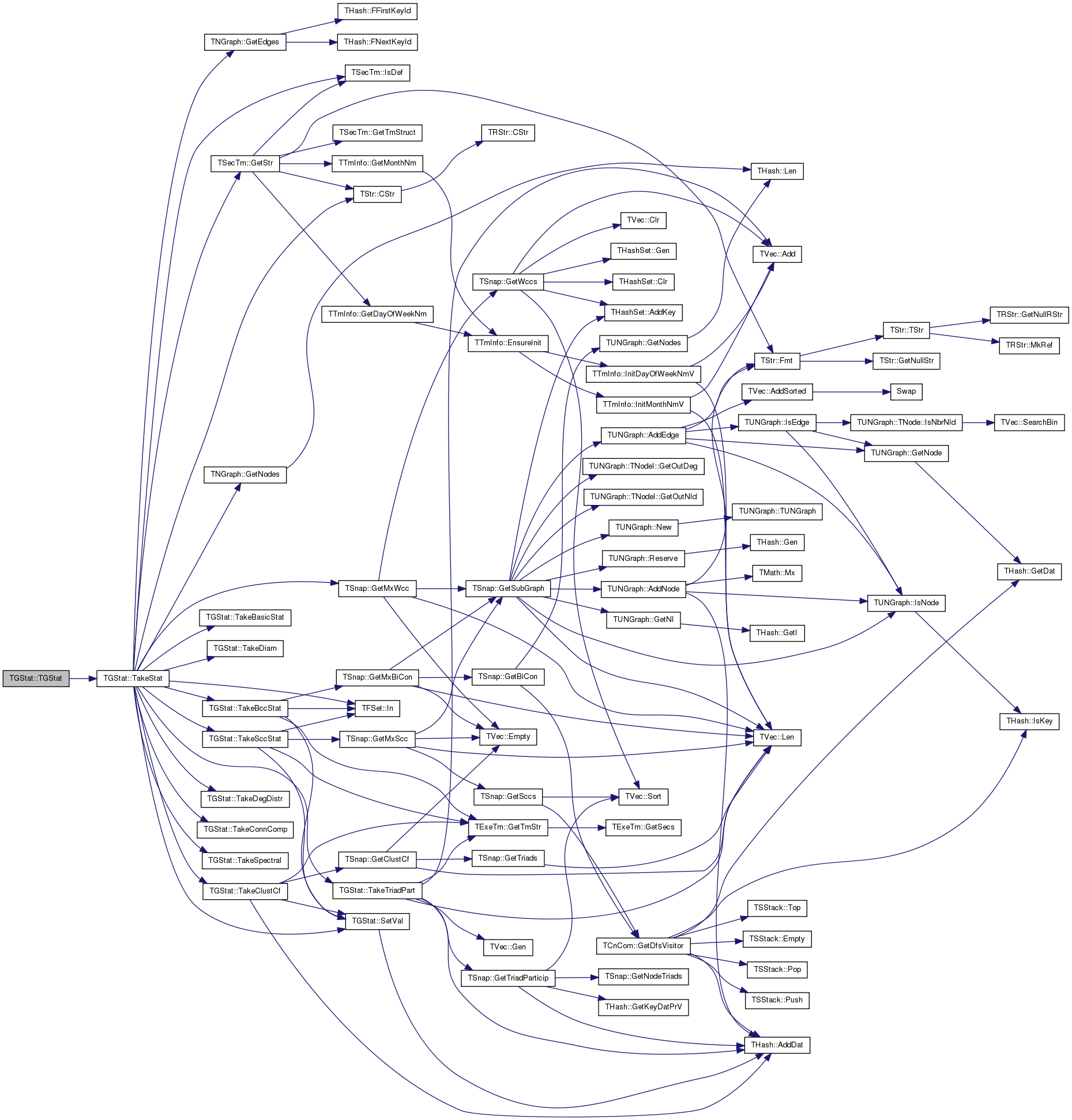
| TGStat::TGStat | ( | const PNEGraph & | Graph, |
| const TSecTm & | Time, | ||
| TFSet | StatFSet = TFSet(), |
||
| const TStr & | GraphName = TStr() |
||
| ) |
Definition at line 33 of file gstat.cpp.
References TakeStat().
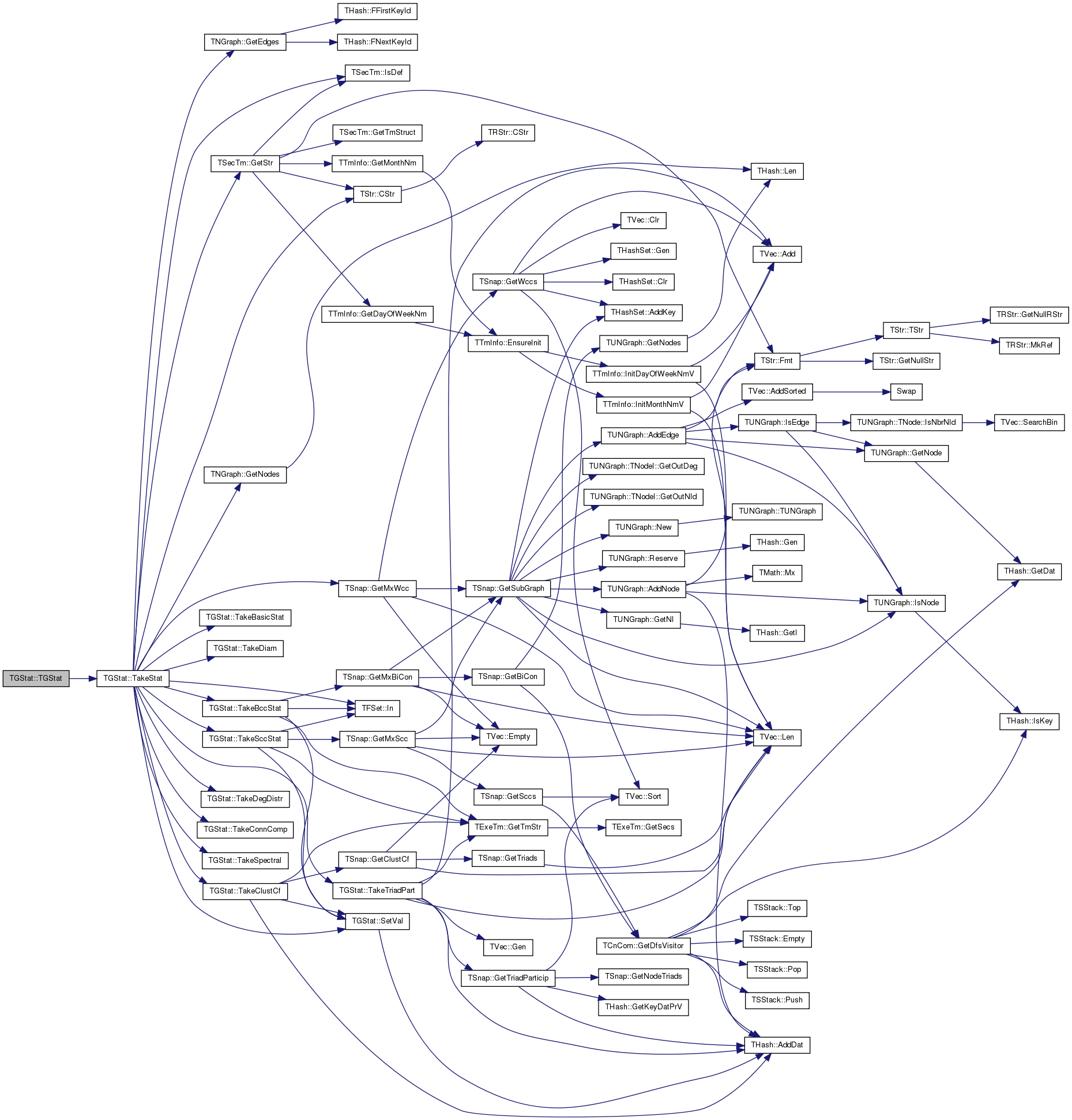
|
inline |
Definition at line 64 of file gstat.h.
References TakeStat().
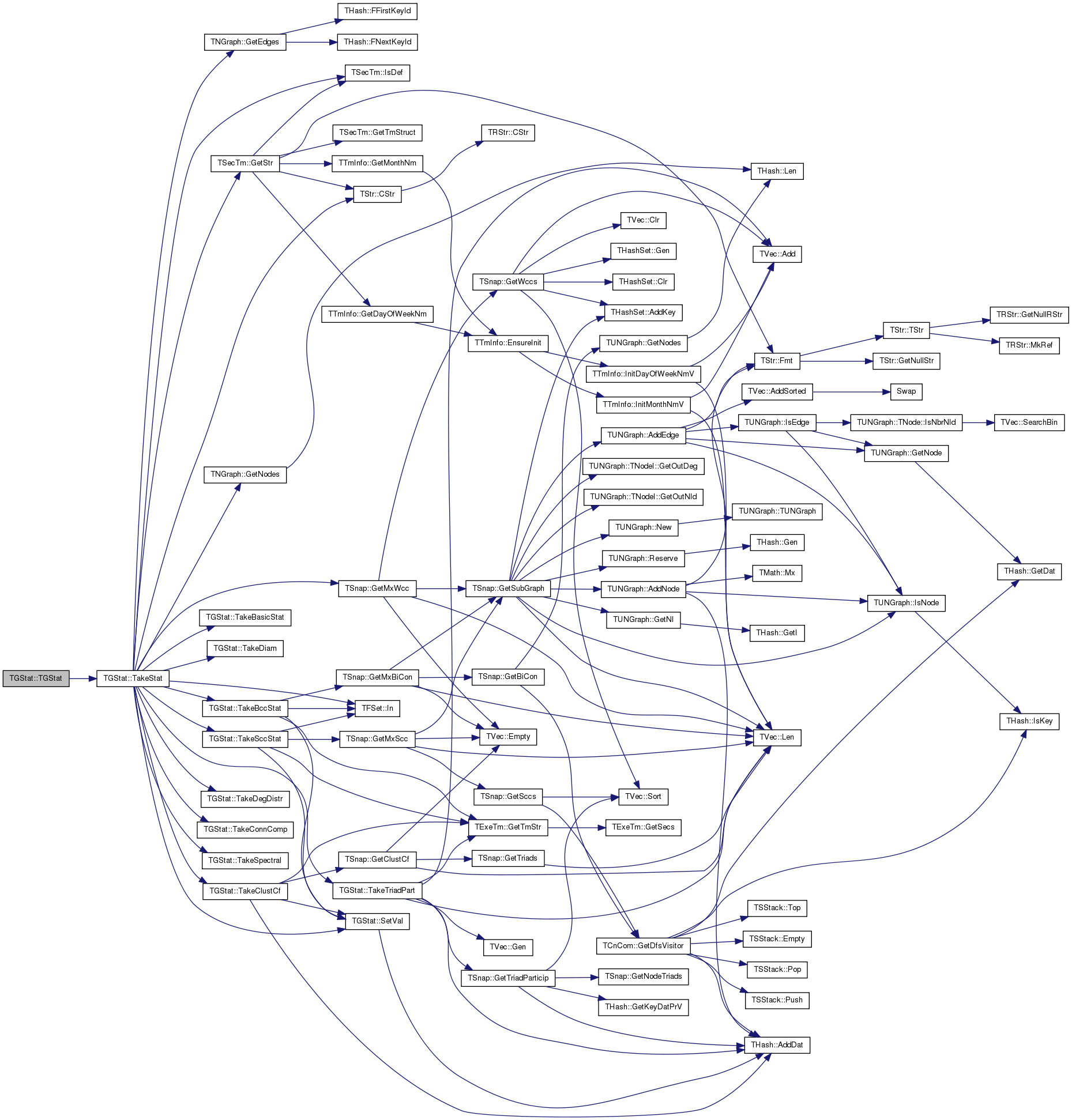
|
static |
Definition at line 401 of file gstat.cpp.
References gsdClustCf, gsdHops, gsdInDeg, gsdOutDeg, gsdScc, gsdSngVal, gsdSngVec, gsdTriadPart, gsdWcc, gsdWccHops, and gsvFullDiam.
Referenced by TFfGGen::GenFFGraphs(), main(), and TGStatVec::TGStatVec().

| void TGStat::AvgGStat | ( | const PGStatVec & | GStatVec, |
| const bool & | ClipAt1 = false |
||
| ) |
Definition at line 243 of file gstat.cpp.
| void TGStat::AvgGStat | ( | const TGStatV & | GStatV, |
| const bool & | ClipAt1 = false |
||
| ) |
Definition at line 247 of file gstat.cpp.
References TMom::Add(), THash< TKey, TDat, THashFunc >::AddDat(), TMom::Def(), TVec< TVal, TSizeTy >::Empty(), THash< TKey, TDat, THashFunc >::GetKeyDatPrV(), TMom::GetMean(), GetVal(), TMom::GetVals(), GraphNm, gsdMx, gsdUndef, gsvMx, HasDistr(), HasVal(), IAssert, TMom::IsUsable(), TVec< TVal, TSizeTy >::Len(), SetDistr(), SetVal(), and Time.
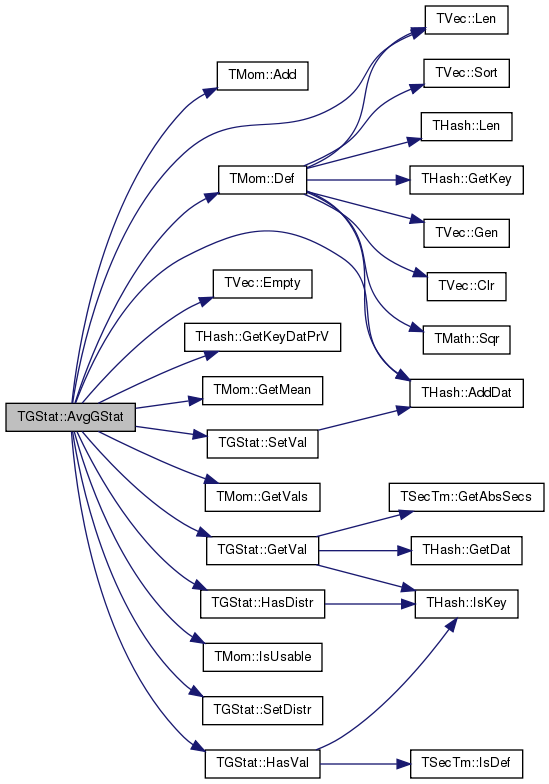
|
static |
|
inline |
Definition at line 80 of file gstat.h.
References TGStat().

|
static |
Definition at line 384 of file gstat.cpp.
| void TGStat::DumpValStat | ( | ) |
Definition at line 235 of file gstat.cpp.
References GetVal(), GetValStr(), gsvMx, gsvNone, and HasVal().
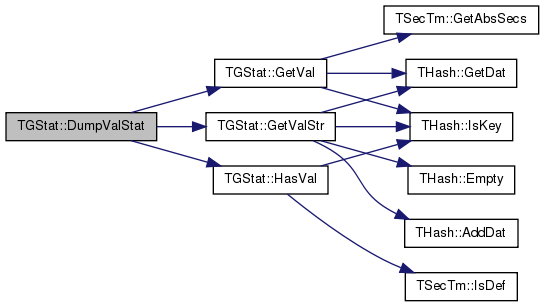
|
inline |
Definition at line 87 of file gstat.h.
References TSecTm::GetDayN().

| const TFltPrV & TGStat::GetDistr | ( | const TGStatDistr & | Distr | ) | const |
Definition at line 92 of file gstat.cpp.
References DistrStatH, and EmptyV.
Referenced by GetDistr(), and Plot().

| void TGStat::GetDistr | ( | const TGStatDistr & | Distr, |
| TFltPrV & | FltPrV | ||
| ) | const |
Definition at line 101 of file gstat.cpp.
References GetDistr().

|
inline |
Definition at line 101 of file gstat.h.
References THash< TKey, TDat, THashFunc >::Len().

|
static |
Definition at line 289 of file gstat.cpp.
References Fail, gsdClustCf, gsdHops, gsdInDeg, gsdMx, gsdOutDeg, gsdScc, gsdSngVal, gsdSngVec, gsdTriadPart, gsdUndef, gsdWcc, and gsdWccHops.
|
inline |
|
inline |
Definition at line 88 of file gstat.h.
References TSecTm::GetHourN().

|
inline |
Definition at line 89 of file gstat.h.
References TSecTm::GetMinN().

|
inline |
Definition at line 86 of file gstat.h.
References TSecTm::GetMonthN().

|
inline |
|
static |
|
static |
Definition at line 358 of file gstat.cpp.
References Fail, gpsLog10XY, gpsLog10Y, gsdClustCf, gsdHops, gsdInDeg, gsdMx, gsdOutDeg, gsdScc, gsdSngVal, gsdSngVec, gsdTriadPart, gsdUndef, gsdWcc, and gsdWccHops.
|
inline |
Definition at line 90 of file gstat.h.
References TSecTm::GetSecN().

|
inline |
Definition at line 95 of file gstat.h.
References TSecTm::GetInUnits().
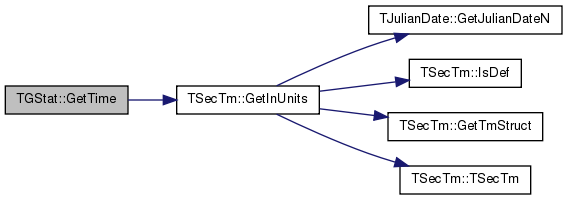
|
inline |
Definition at line 91 of file gstat.h.
References TSecTm::GetStr().
Referenced by TGStatVec::SaveTxt().


| double TGStat::GetVal | ( | const TGStatVal & | StatVal | ) | const |
Definition at line 81 of file gstat.cpp.
References TSecTm::GetAbsSecs(), THash< TKey, TDat, THashFunc >::GetDat(), gsvIndex, gsvTime, THash< TKey, TDat, THashFunc >::IsKey(), Time, and ValStatH.
Referenced by AvgGStat(), DumpValStat(), GetEdges(), GetNodes(), TGStat::TCmpByVal::operator()(), TGStatVec::SaveTxt(), and TakeBasicStat().
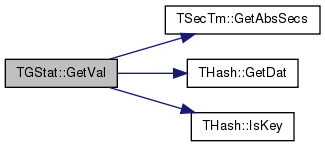
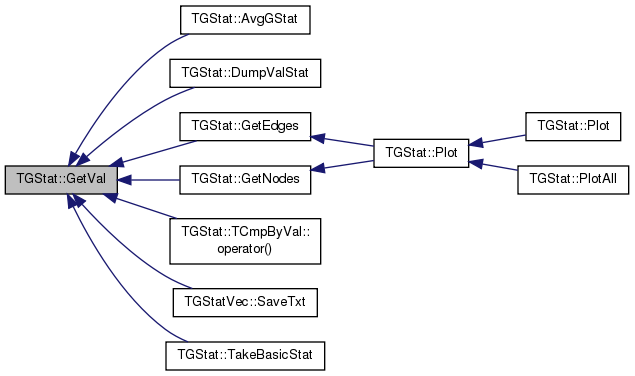
|
inline |
Definition at line 97 of file gstat.h.
References THash< TKey, TDat, THashFunc >::Len().

Definition at line 307 of file gstat.cpp.
References THash< TKey, TDat, THashFunc >::AddDat(), THash< TKey, TDat, THashFunc >::Empty(), THash< TKey, TDat, THashFunc >::GetDat(), gsvBccEdges, gsvBccNodes, gsvBccSize, gsvBiDirEdges, gsvClosedTriads, gsvClustCf, gsvDstNodes, gsvEdges, gsvEffDiam, gsvEffDiamDev, gsvEffWccDiam, gsvEffWccDiamDev, gsvFullDiam, gsvFullDiamDev, gsvFullWccDiam, gsvFullWccDiamDev, gsvIndex, gsvMx, gsvNodes, gsvNone, gsvNonZNodes, gsvOpenTriads, gsvSccEdges, gsvSccNodes, gsvSccSize, gsvSrcNodes, gsvTime, gsvUniqEdges, gsvWccBiDirEdges, gsvWccDstNodes, gsvWccEdges, gsvWccNodes, gsvWccSize, gsvWccSrcNodes, gsvWccUniqEdges, gsvZeroNodes, IAssert, and THash< TKey, TDat, THashFunc >::IsKey().
Referenced by DumpValStat(), TGStat::TCmpByVal::operator()(), TGStatVec::Plot(), and TGStatVec::SaveTxt().
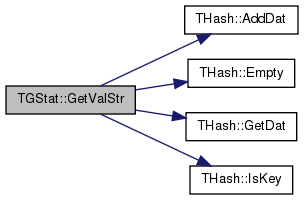
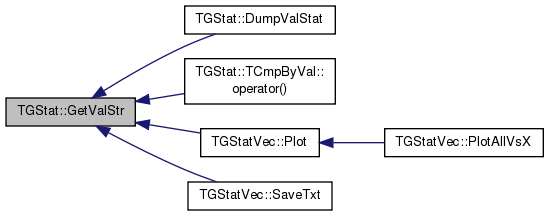
|
inline |
Definition at line 85 of file gstat.h.
References TSecTm::GetYearN().

|
inline |
Definition at line 102 of file gstat.h.
References THash< TKey, TDat, THashFunc >::IsKey().
Referenced by AvgGStat(), and Plot().


| bool TGStat::HasVal | ( | const TGStatVal & | StatVal | ) | const |
Definition at line 75 of file gstat.cpp.
References gsvIndex, gsvTime, TSecTm::IsDef(), THash< TKey, TDat, THashFunc >::IsKey(), Time, and ValStatH.
Referenced by AvgGStat(), DumpValStat(), and TGStat::TCmpByVal::operator()().

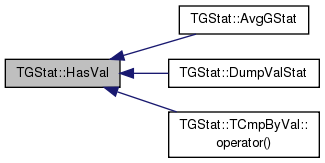
Definition at line 79 of file gstat.h.
References TGStat().

|
inlinestatic |
Definition at line 69 of file gstat.h.
References TGStat().
Referenced by TGStatVec::Add(), and TGStatVec::GetAvgGStat().


|
inlinestatic |
Definition at line 71 of file gstat.h.
References TGStat().

|
inlinestatic |
Definition at line 73 of file gstat.h.
References TGStat().

|
inlinestatic |
Definition at line 75 of file gstat.h.
References TGStat().

|
inline |
Definition at line 77 of file gstat.h.
References TGStat().

|
static |
Definition at line 388 of file gstat.cpp.
References gsdInDeg, gsdOutDeg, gsdScc, and gsdWcc.
|
static |
Definition at line 392 of file gstat.cpp.
References gsdHops, and gsdWccHops.
|
static |
Definition at line 396 of file gstat.cpp.
References gsdClustCf, gsdHops, gsdInDeg, gsdOutDeg, gsdScc, gsdTriadPart, gsdWcc, and gsdWccHops.
| bool TGStat::operator< | ( | const TGStat & | GStat | ) | const |
Definition at line 61 of file gstat.cpp.
References THash< TKey, TDat, THashFunc >::Empty(), THash< TKey, TDat, THashFunc >::GetDat(), gsvMx, gsvTime, THash< TKey, TDat, THashFunc >::IsKey(), Time, and ValStatH.
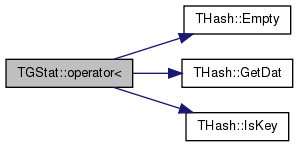
| bool TGStat::operator== | ( | const TGStat & | GStat | ) | const |
| void TGStat::Plot | ( | const TGStatDistr & | Distr, |
| const TStr & | FNmPref, | ||
| TStr | Desc = TStr(), |
||
| bool | PowerFit = false |
||
| ) | const |
Definition at line 204 of file gstat.cpp.
References TGnuPlot::AddPlot(), TGnuPlot::AddPwrFit(), TStr::CStr(), TStr::Empty(), TStr::Fmt(), GetDistr(), GetEdges(), GetNodes(), GetPlotInfo(), TStr::GetUc(), gpwLines, gpwLinesPoints, gsdMx, gsdUndef, HasDistr(), TGnuPlot::SaveEps(), TGnuPlot::SavePng(), TGnuPlot::SetScale(), TGnuPlot::SetXYLabel(), TQuad< TVal1, TVal2, TVal3, TVal4 >::Val1, TQuad< TVal1, TVal2, TVal3, TVal4 >::Val2, TQuad< TVal1, TVal2, TVal3, TVal4 >::Val3, and TQuad< TVal1, TVal2, TVal3, TVal4 >::Val4.
Referenced by Plot(), and PlotAll().
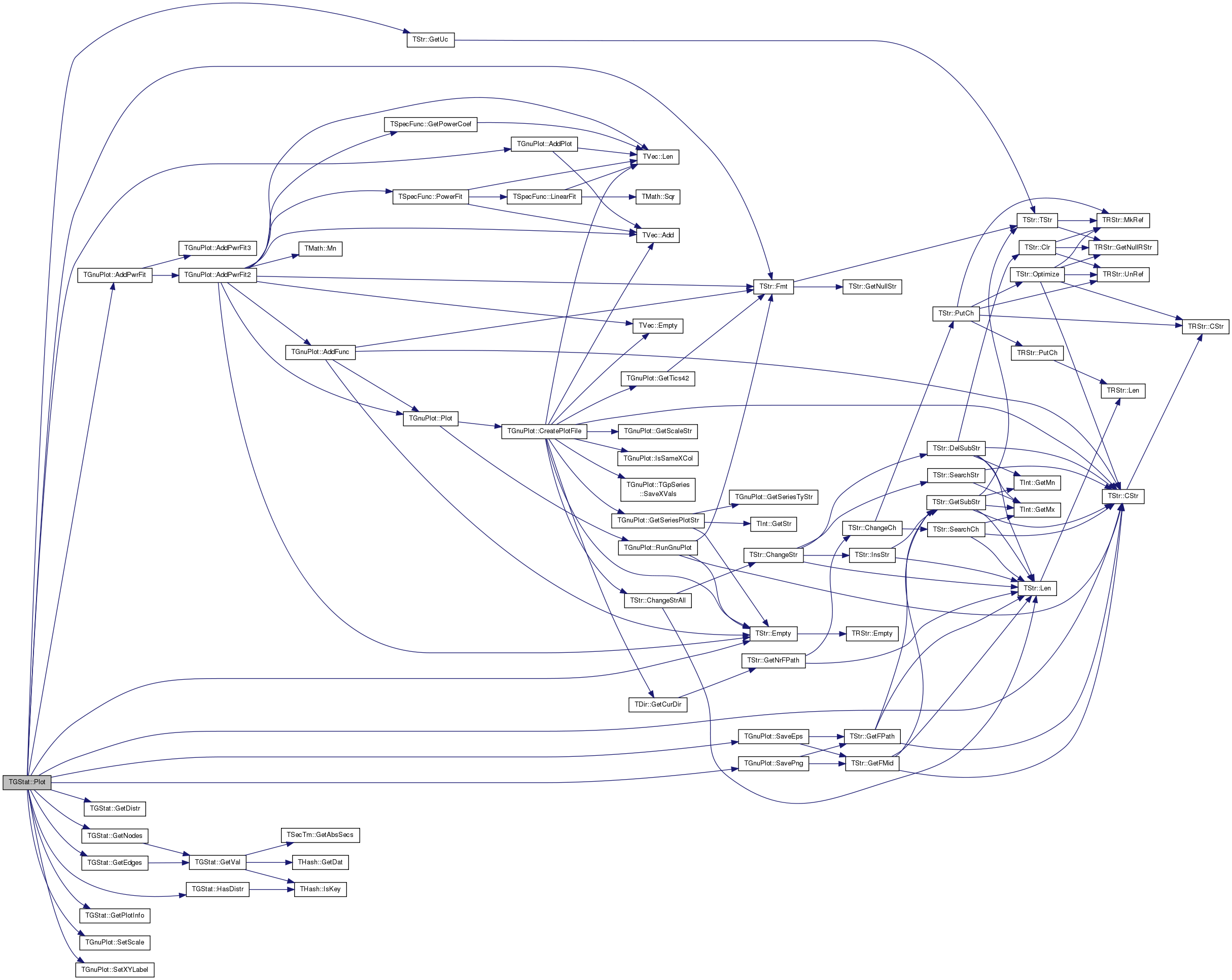

| void TGStat::Plot | ( | const TFSet & | FSet, |
| const TStr & | FNmPref, | ||
| const TStr & | Desc = TStr(), |
||
| bool | PowerFit = false |
||
| ) | const |
Definition at line 220 of file gstat.cpp.
References gsdMx, gsdUndef, TFSet::In(), and Plot().
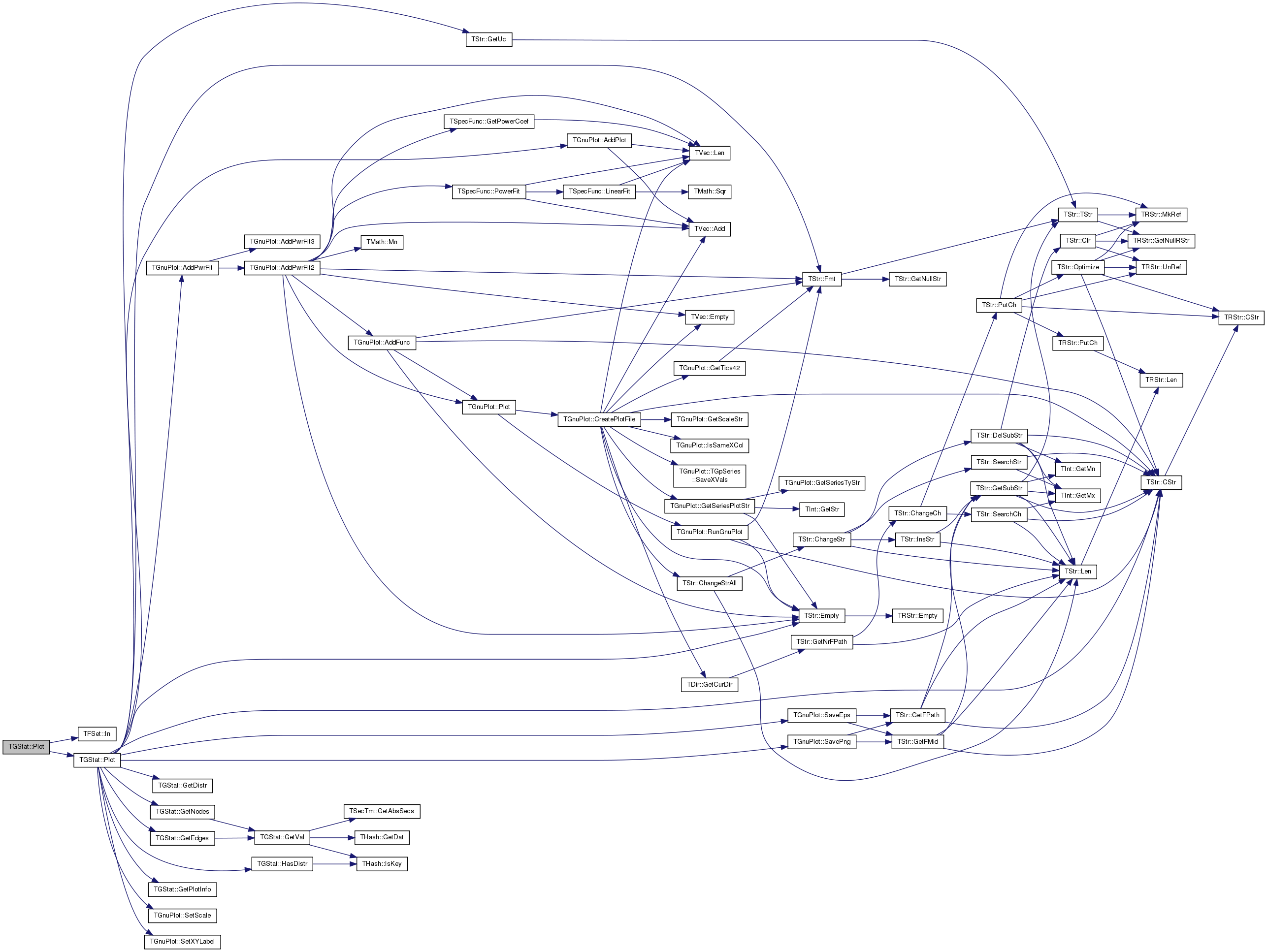
Definition at line 228 of file gstat.cpp.
References gsdMx, gsdUndef, and Plot().
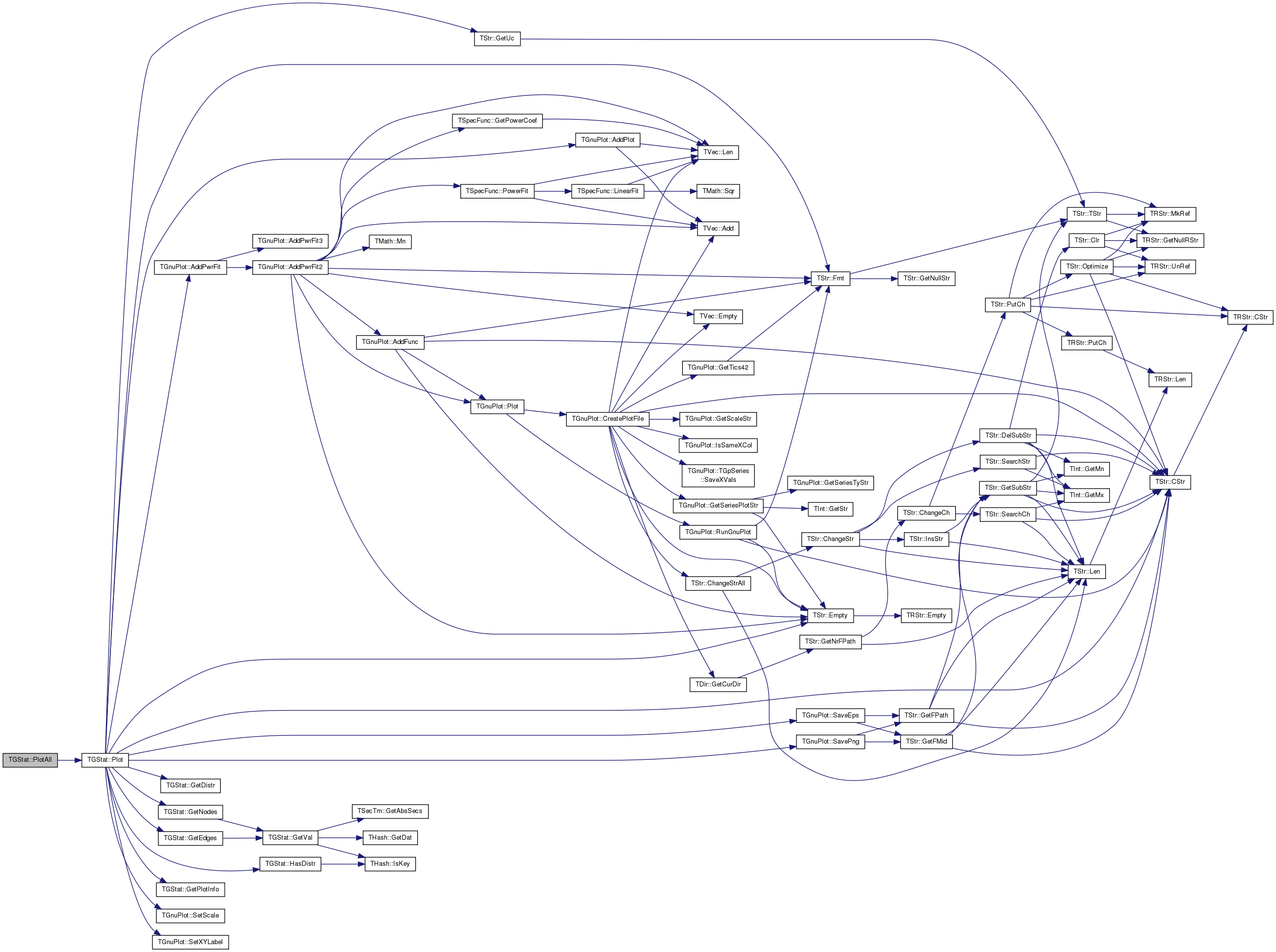
| void TGStat::Save | ( | TSOut & | SOut | ) | const |
Definition at line 42 of file gstat.cpp.
References DistrStatH, GraphNm, TSecTm::Save(), THash< TKey, TDat, THashFunc >::Save(), TStr::Save(), Time, and ValStatH.

| void TGStat::SetDistr | ( | const TGStatDistr & | Distr, |
| const TFltPrV & | FltPrV | ||
| ) |
Definition at line 97 of file gstat.cpp.
References DistrStatH.
Referenced by AvgGStat().

| void TGStat::SetVal | ( | const TGStatVal & | StatVal, |
| const double & | Val | ||
| ) |
Definition at line 88 of file gstat.cpp.
References THash< TKey, TDat, THashFunc >::AddDat(), and ValStatH.
Referenced by AvgGStat(), TTimeNet::PlotMissingPast(), TakeBasicStat(), TakeBccStat(), TakeClustCf(), TakeDiam(), TakeSccStat(), and TakeStat().

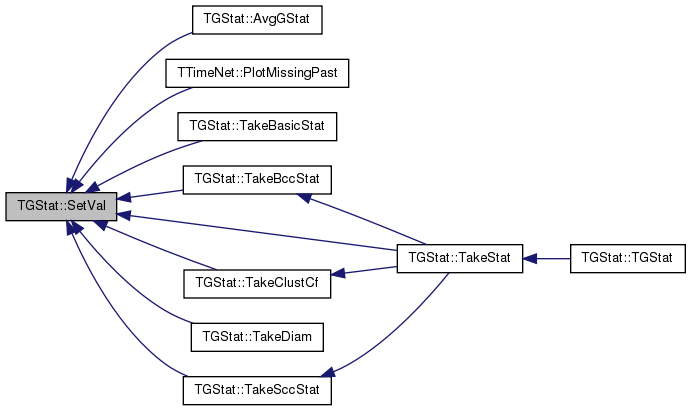
| void TGStat::TakeBasicStat | ( | const PGraph & | Graph, |
| const bool & | IsMxWcc = false |
||
| ) |
Definition at line 257 of file gstat.h.
References gsvBiDirEdges, and gsvWccBiDirEdges.
Referenced by TTimeNet::PlotMissingPast(), and TakeStat().

| void TGStat::TakeBasicStat | ( | const PGraph & | Graph, |
| TFSet | FSet, | ||
| const bool & | IsMxWcc = false |
||
| ) |
Definition at line 262 of file gstat.h.
References TSnap::CntDegNodes(), TSnap::CntInDegNodes(), TSnap::CntOutDegNodes(), TSnap::CntUniqBiDirEdges(), TSnap::CntUniqDirEdges(), TExeTm::GetTmStr(), GetVal(), gfDirected, gfMultiGraph, gsvBiDirEdges, gsvDstNodes, gsvEdges, gsvNodes, gsvNonZNodes, gsvSrcNodes, gsvUniqEdges, gsvWccBiDirEdges, gsvWccDstNodes, gsvWccEdges, gsvWccNodes, gsvWccSrcNodes, gsvWccUniqEdges, gsvZeroNodes, TFSet::In(), and SetVal().
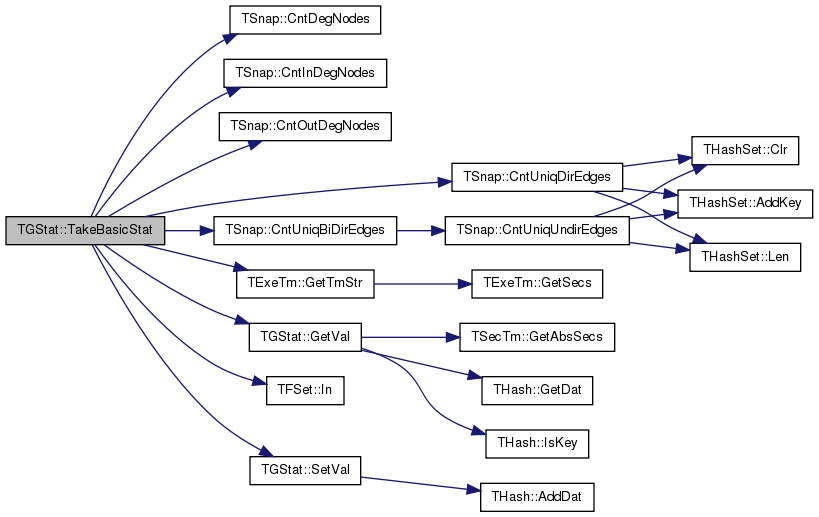
| void TGStat::TakeBccStat | ( | const PGraph & | Graph, |
| TFSet | StatFSet | ||
| ) |
Definition at line 434 of file gstat.h.
References TSnap::GetMxBiCon(), TExeTm::GetTmStr(), gsvBccEdges, gsvBccNodes, gsvBccSize, TFSet::In(), and SetVal().
Referenced by TakeStat().
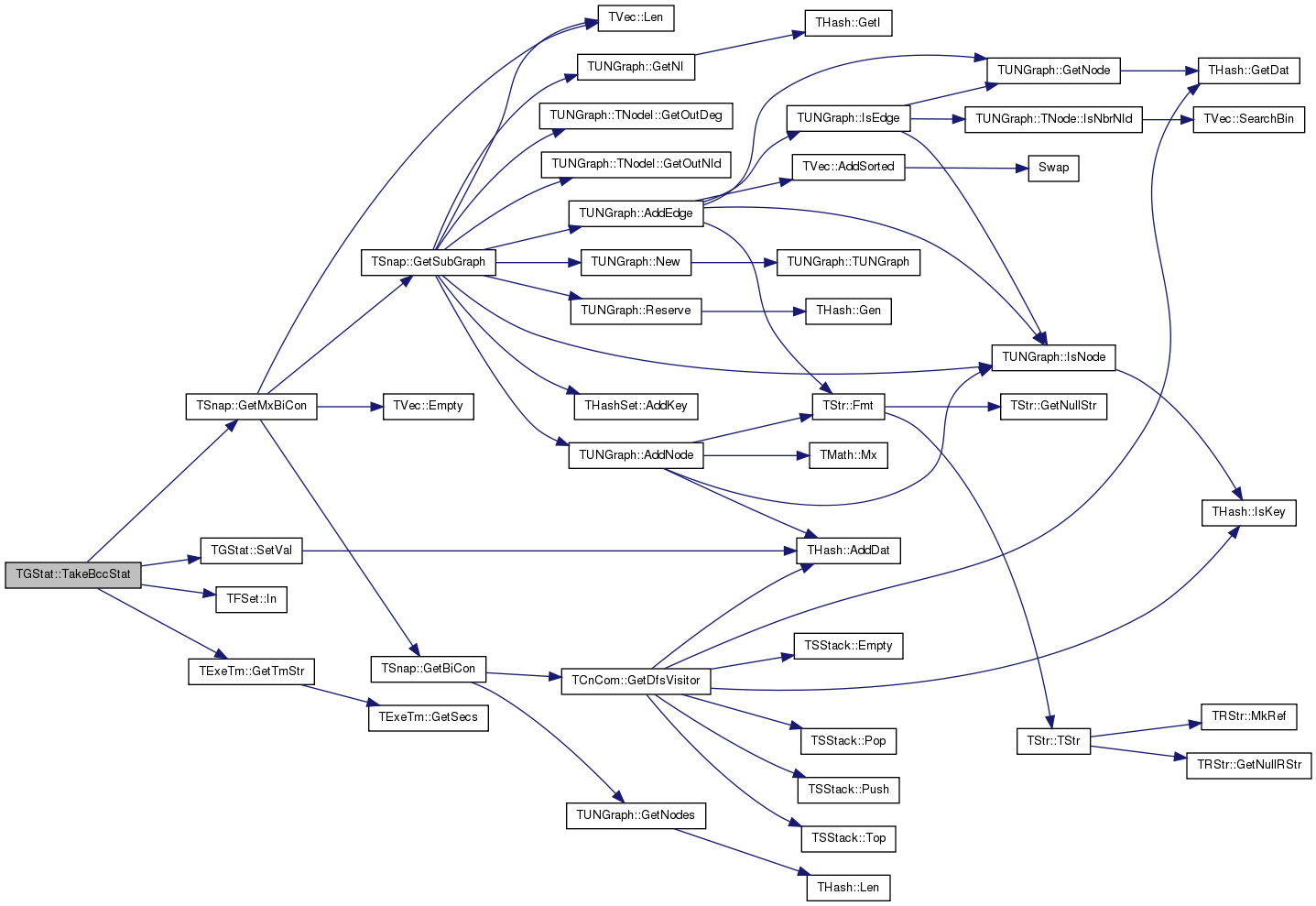

| void TGStat::TakeClustCf | ( | const PGraph & | Graph, |
| const int & | SampleNodes = -1 |
||
| ) |
Definition at line 447 of file gstat.h.
References THash< TKey, TDat, THashFunc >::AddDat(), TSnap::GetClustCf(), TExeTm::GetTmStr(), gsdClustCf, gsvClosedTriads, gsvClustCf, gsvOpenTriads, and SetVal().
Referenced by TakeStat().
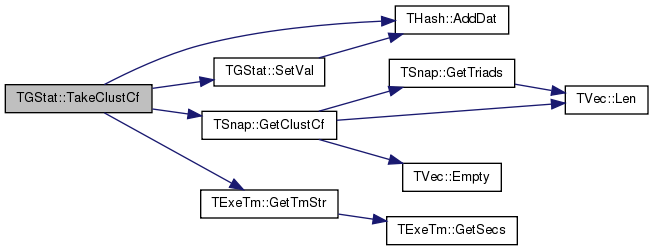

| void TGStat::TakeConnComp | ( | const PGraph & | Graph | ) |
Definition at line 392 of file gstat.h.
References gsdScc, and gsdWcc.
Referenced by TakeStat().

| void TGStat::TakeConnComp | ( | const PGraph & | Graph, |
| TFSet | StatFSet | ||
| ) |
Definition at line 397 of file gstat.h.
References TVec< TVal, TSizeTy >::Add(), THash< TKey, TDat, THashFunc >::AddDat(), TVec< TVal, TSizeTy >::Gen(), TSnap::GetSccSzCnt(), TExeTm::GetTmStr(), TSnap::GetWccSzCnt(), gsdScc, gsdWcc, TFSet::In(), and TVec< TVal, TSizeTy >::Len().
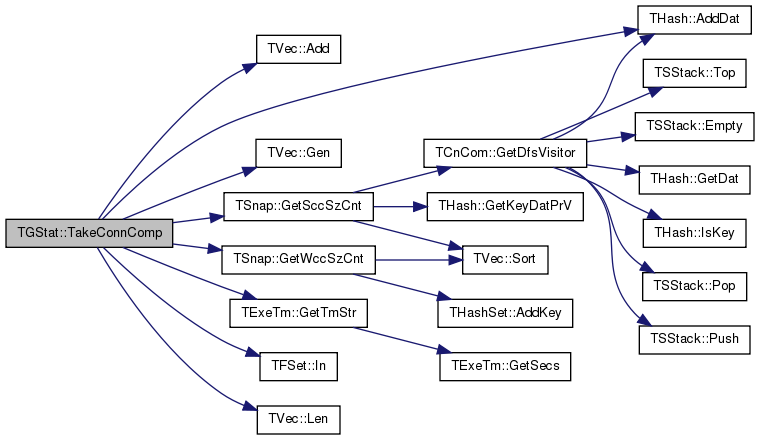
| void TGStat::TakeDegDistr | ( | const PGraph & | Graph | ) |
Definition at line 301 of file gstat.h.
References gsdInDeg, and gsdOutDeg.
Referenced by TakeStat().

| void TGStat::TakeDegDistr | ( | const PGraph & | Graph, |
| TFSet | StatFSet | ||
| ) |
Definition at line 306 of file gstat.h.
References THash< TKey, TDat, THashFunc >::AddDat(), TSnap::GetInDegCnt(), TSnap::GetOutDegCnt(), TExeTm::GetTmStr(), gsdInDeg, gsdOutDeg, and TFSet::In().
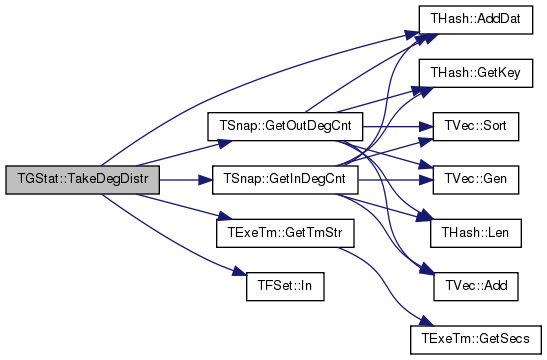
| void TGStat::TakeDiam | ( | const PGraph & | Graph, |
| const bool & | IsMxWcc = false |
||
| ) |
Definition at line 326 of file gstat.h.
References gsdHops, gsdWccHops, gsvEffDiam, gsvEffWccDiam, and gsvFullDiam.
Referenced by TakeStat().

| void TGStat::TakeDiam | ( | const PGraph & | Graph, |
| TFSet | StatFSet, | ||
| const bool & | IsMxWcc = false |
||
| ) |
Definition at line 332 of file gstat.h.
References TMom::Add(), THash< TKey, TDat, THashFunc >::AddDat(), TSnap::TSnapDetail::CalcEffDiam(), TMom::Def(), TVec< TVal, TSizeTy >::Gen(), TSnap::GetAnf(), TSnap::GetBfsFullDiam(), TMom::GetMean(), TMom::GetSDev(), TExeTm::GetTmStr(), gsdHops, gsdWccHops, gsvEffDiam, gsvEffDiamDev, gsvEffWccDiam, gsvEffWccDiamDev, gsvFullDiam, gsvFullDiamDev, TFSet::In(), TVec< TVal, TSizeTy >::Len(), NDiamRuns, SetVal(), and TExeTm::Tick().
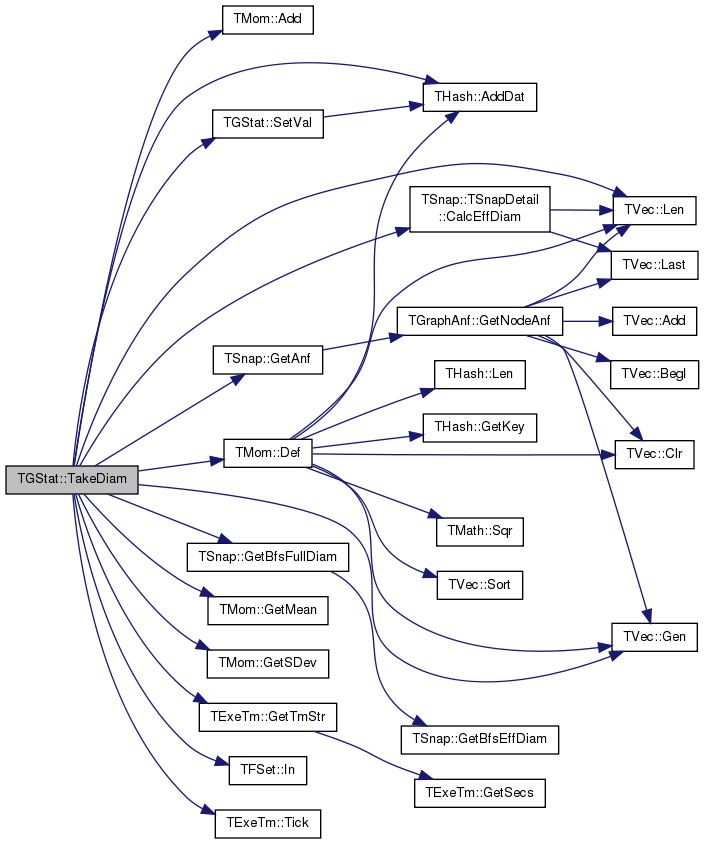
| void TGStat::TakeSccStat | ( | const PGraph & | Graph, |
| TFSet | StatFSet | ||
| ) |
Definition at line 421 of file gstat.h.
References TSnap::GetMxScc(), TExeTm::GetTmStr(), gsvSccEdges, gsvSccNodes, gsvSccSize, TFSet::In(), and SetVal().
Referenced by TakeStat().
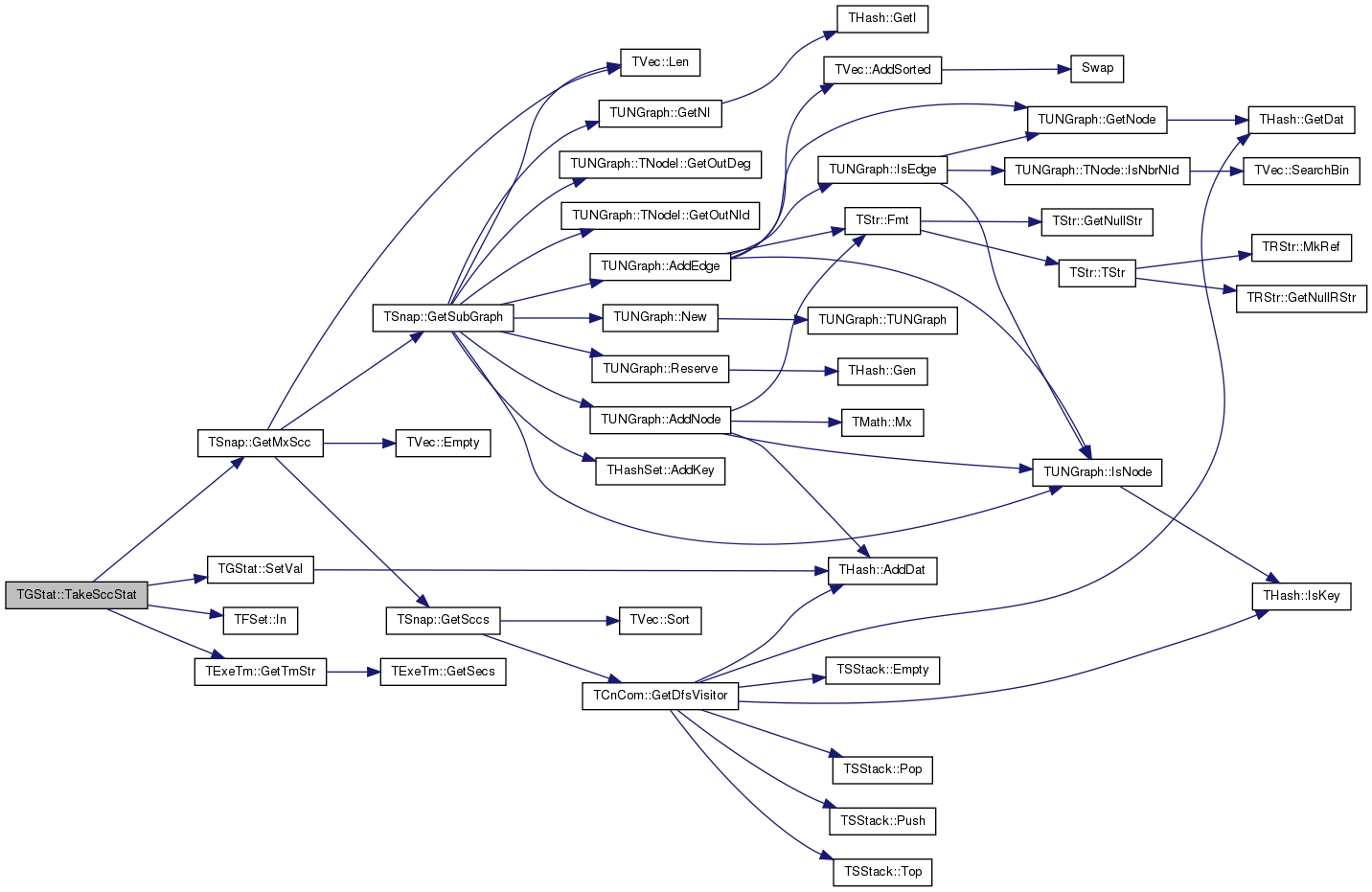

| void TGStat::TakeSpectral | ( | const PNGraph & | Graph, |
| const int | _TakeSngVals = -1 |
||
| ) |
Definition at line 169 of file gstat.cpp.
References gsdSngVal, and gsdSngVec.
Referenced by TakeStat().

Definition at line 173 of file gstat.cpp.
References TVec< TVal, TSizeTy >::Add(), DistrStatH, TVec< TVal, TSizeTy >::Gen(), TNGraph::GetNodes(), TSnap::GetSngVals(), TSnap::GetSngVec(), TExeTm::GetTmStr(), gsdSngVal, gsdSngVec, TFSet::In(), Kilo, TVec< TVal, TSizeTy >::Len(), TMath::Mn(), TVec< TVal, TSizeTy >::Sort(), and TakeSngVals.
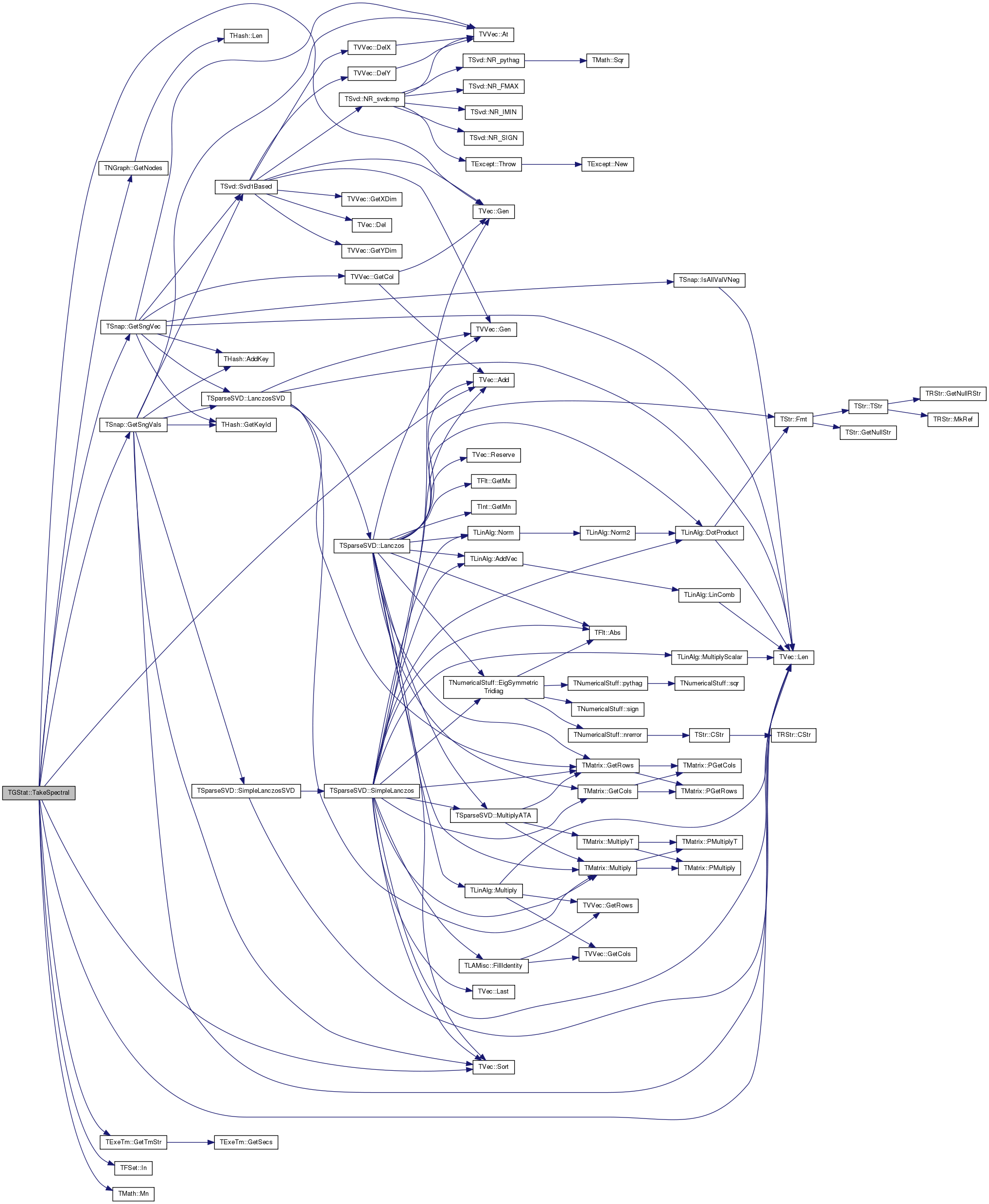
| void TGStat::TakeStat | ( | const PNGraph & | Graph, |
| const TSecTm & | Time, | ||
| TFSet | StatFSet, | ||
| const TStr & | GraphName | ||
| ) |
Definition at line 105 of file gstat.cpp.
References TStr::CStr(), TNGraph::GetEdges(), TSnap::GetMxWcc(), TNGraph::GetNodes(), TSecTm::GetStr(), GraphNm, gsdClustCf, gsdTriadPart, gsdWcc, gsdWccHops, gsvClustCf, gsvEffWccDiam, gsvFullDiam, gsvNone, gsvWccBiDirEdges, gsvWccDstNodes, gsvWccEdges, gsvWccNodes, gsvWccSize, gsvWccSrcNodes, gsvWccUniqEdges, TFSet::In(), TSecTm::IsDef(), SetVal(), TakeBasicStat(), TakeBccStat(), TakeClustCf(), TakeConnComp(), TakeDegDistr(), TakeDiam(), TakeSccStat(), TakeSpectral(), TakeTriadPart(), and Time.
Referenced by TGStat().
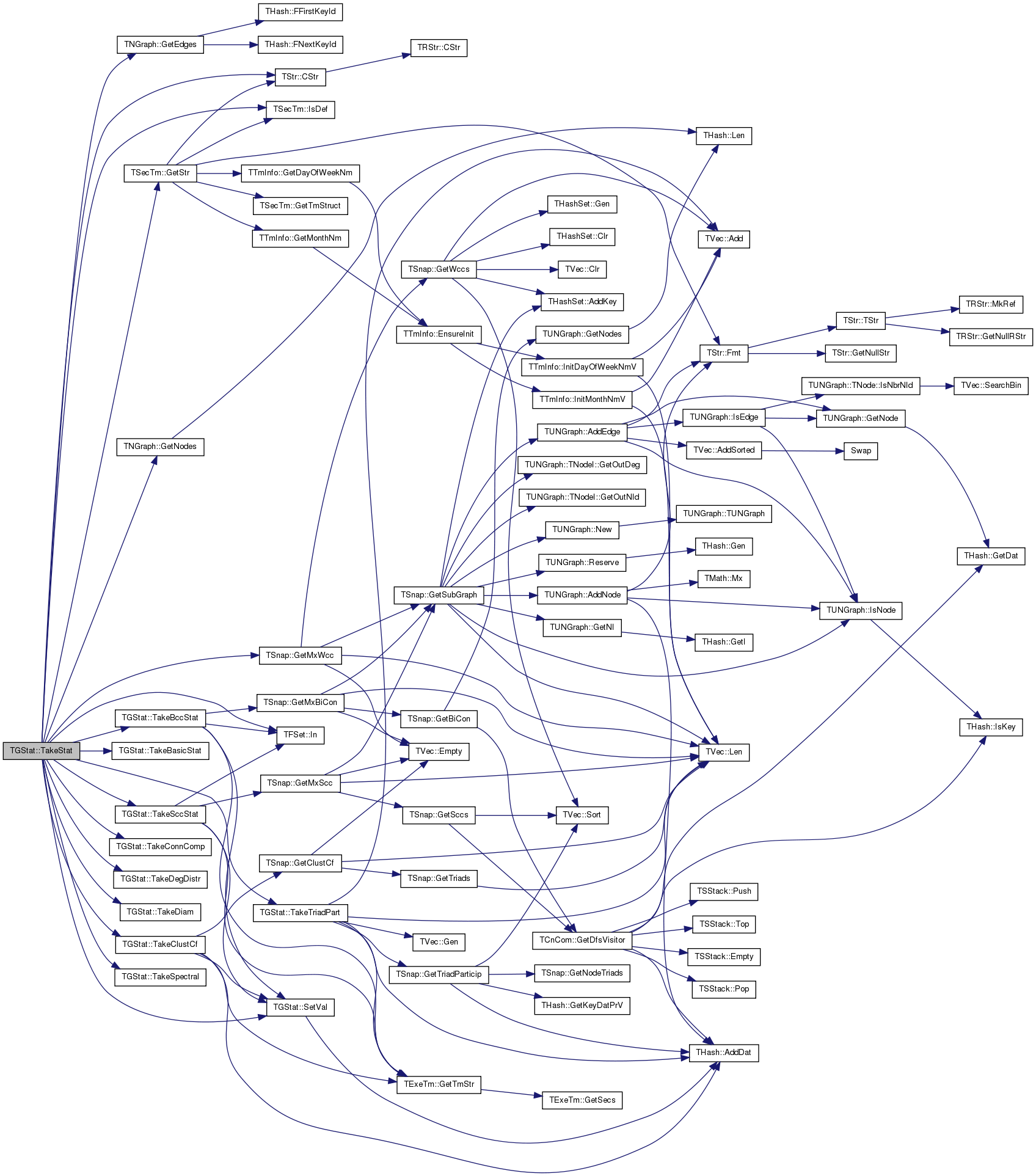

| void TGStat::TakeStat | ( | const PUNGraph & | Graph, |
| const TSecTm & | Time, | ||
| TFSet | StatFSet, | ||
| const TStr & | GraphName | ||
| ) |
Definition at line 137 of file gstat.cpp.
References TStr::CStr(), TUNGraph::GetEdges(), TSnap::GetMxWcc(), TUNGraph::GetNodes(), TSecTm::GetStr(), GraphNm, gsdClustCf, gsdTriadPart, gsdWcc, gsdWccHops, gsvClustCf, gsvEffWccDiam, gsvFullDiam, gsvNone, gsvWccBiDirEdges, gsvWccDstNodes, gsvWccEdges, gsvWccNodes, gsvWccSize, gsvWccSrcNodes, gsvWccUniqEdges, TFSet::In(), TSecTm::IsDef(), SetVal(), TakeBasicStat(), TakeBccStat(), TakeClustCf(), TakeConnComp(), TakeDegDistr(), TakeDiam(), TakeTriadPart(), and Time.
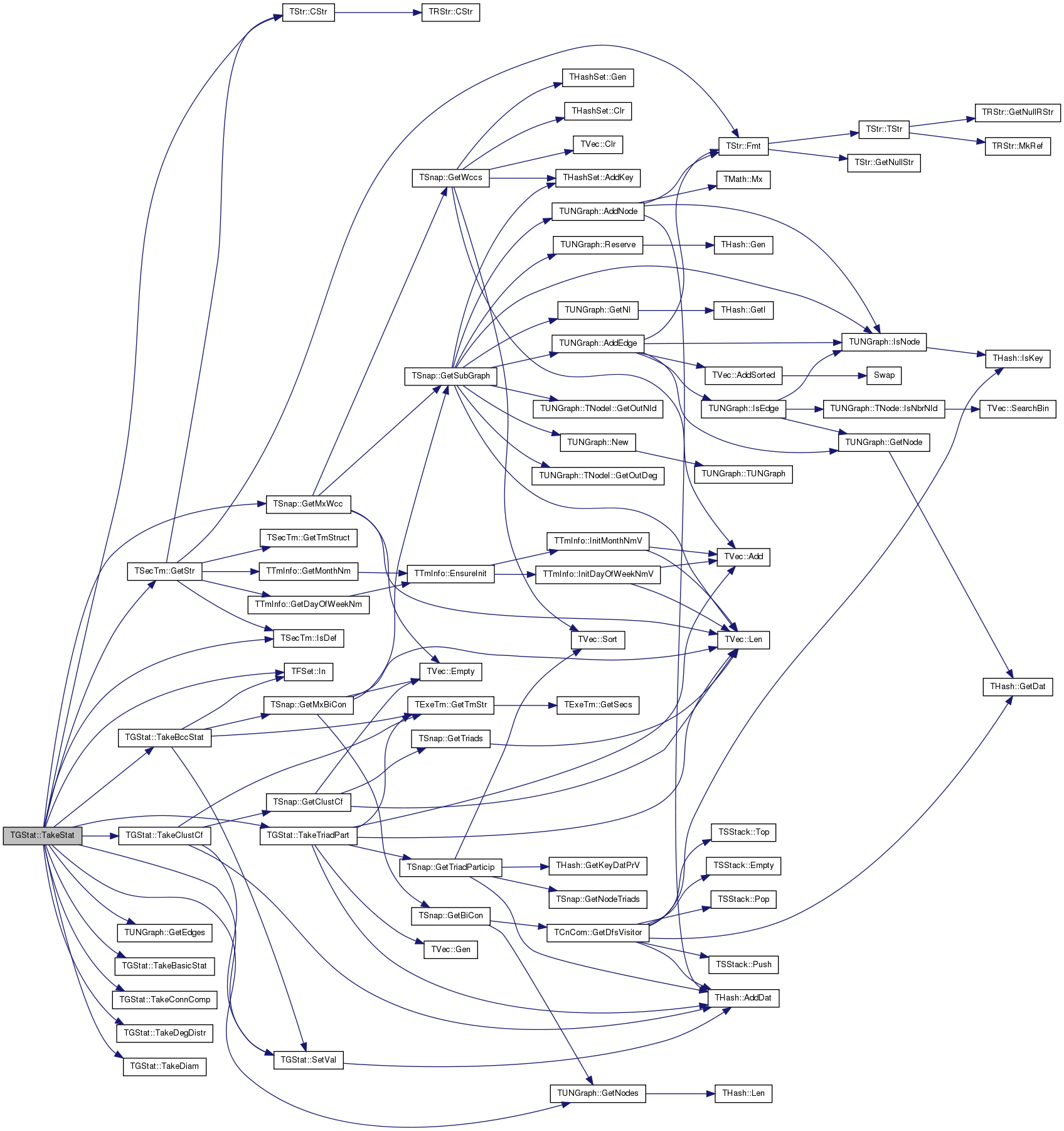
| void TGStat::TakeStat | ( | const PGraph & | Graph, |
| const TSecTm & | Time, | ||
| TFSet | StatFSet, | ||
| const TStr & | GraphName | ||
| ) |
Definition at line 219 of file gstat.h.
References TSnap::GetMxWcc(), gsdClustCf, gsdHops, gsdScc, gsdTriadPart, gsdWcc, gsdWccHops, gsvClustCf, gsvEffDiam, gsvEffWccDiam, gsvFullDiam, gsvNone, gsvWccSize, TFSet::In(), SetVal(), TakeBasicStat(), TakeBccStat(), TakeClustCf(), TakeConnComp(), TakeDegDistr(), TakeDiam(), TakeSccStat(), TakeSpectral(), and TakeTriadPart().
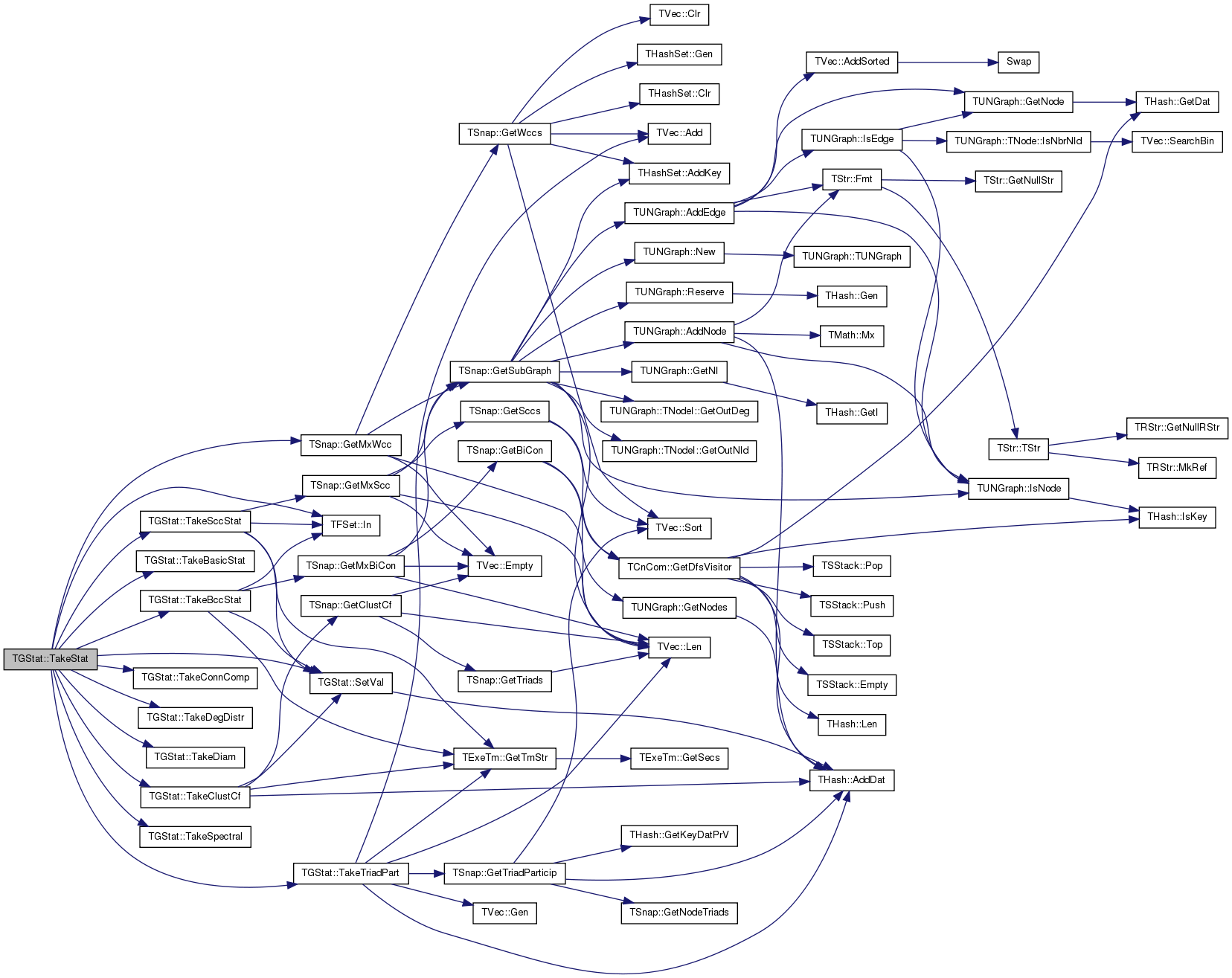
| void TGStat::TakeTriadPart | ( | const PGraph & | Graph | ) |
Definition at line 460 of file gstat.h.
References TVec< TVal, TSizeTy >::Add(), THash< TKey, TDat, THashFunc >::AddDat(), TVec< TVal, TSizeTy >::Gen(), TExeTm::GetTmStr(), TSnap::GetTriadParticip(), gsdTriadPart, and TVec< TVal, TSizeTy >::Len().
Referenced by TakeStat().
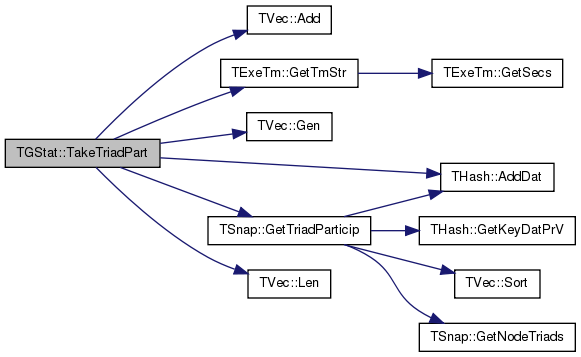

Definition at line 58 of file gstat.h.
Referenced by GetDistr(), operator=(), operator==(), Save(), SetDistr(), and TakeSpectral().
Definition at line 52 of file gstat.h.
Referenced by GetDistr().
| TStr TGStat::GraphNm |
Definition at line 56 of file gstat.h.
Referenced by AvgGStat(), GetNm(), operator=(), Save(), and TakeStat().
|
static |
Definition at line 38 of file gstat.h.
Referenced by TFfGGen::GenFFGraphs(), TakeDiam(), and TTimeNENet::TimeGrowth().
|
static |
Definition at line 39 of file gstat.h.
Referenced by TakeSpectral().
| TSecTm TGStat::Time |
Definition at line 55 of file gstat.h.
Referenced by AvgGStat(), GetVal(), HasVal(), TGStat::TCmpByVal::operator()(), operator<(), operator=(), operator==(), Save(), and TakeStat().
| TIntFltH TGStat::ValStatH |
Definition at line 57 of file gstat.h.
Referenced by GetVal(), HasVal(), operator<(), operator=(), operator==(), Save(), and SetVal().